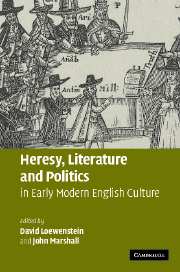Book contents
- Frontmatter
- Contents
- Acknowledgments
- Notes on contributors
- Introduction
- 1 Writing and the persecution of heretics in Henry VIII's England: The Examinations of Anne Askew
- 2 Anabaptism and anti-Anabaptism in the early English Reformation: defining Protestant heresy and orthodoxy during the reign of Edward VI
- 3 “Godlie matrons” and “loose-bodied dames”: heresy and gender in the Family of Love
- 4 Puritanism, Familism, and heresy in early Stuart England: the case of John Etherington revisited
- 5 A ticklish business: defining heresy and orthodoxy in the Puritan revolution
- 6 Thomas Edwards's Gangraena and heresiological traditions
- 7 “And if God was one of us”: Paul Best, John Biddle, and anti-Trinitarian heresy in seventeenth-century England
- 8 The road to George Hill: the heretical dynamic of Winstanley's early prose
- 9 Milton and the heretical priesthood of Christ
- 10 An Historical Narration Concerning Heresie: Thomas Hobbes, Thomas Barlow, and the Restoration debate over “heresy”
- 11 Defining and redefining heresy up to Locke's Letters Concerning Toleration
- 12 “Take heed of being too forward in imposinge on others”: orthodoxy and heresy in the Baxterian tradition
- Index
10 - An Historical Narration Concerning Heresie: Thomas Hobbes, Thomas Barlow, and the Restoration debate over “heresy”
Published online by Cambridge University Press: 20 February 2010
- Frontmatter
- Contents
- Acknowledgments
- Notes on contributors
- Introduction
- 1 Writing and the persecution of heretics in Henry VIII's England: The Examinations of Anne Askew
- 2 Anabaptism and anti-Anabaptism in the early English Reformation: defining Protestant heresy and orthodoxy during the reign of Edward VI
- 3 “Godlie matrons” and “loose-bodied dames”: heresy and gender in the Family of Love
- 4 Puritanism, Familism, and heresy in early Stuart England: the case of John Etherington revisited
- 5 A ticklish business: defining heresy and orthodoxy in the Puritan revolution
- 6 Thomas Edwards's Gangraena and heresiological traditions
- 7 “And if God was one of us”: Paul Best, John Biddle, and anti-Trinitarian heresy in seventeenth-century England
- 8 The road to George Hill: the heretical dynamic of Winstanley's early prose
- 9 Milton and the heretical priesthood of Christ
- 10 An Historical Narration Concerning Heresie: Thomas Hobbes, Thomas Barlow, and the Restoration debate over “heresy”
- 11 Defining and redefining heresy up to Locke's Letters Concerning Toleration
- 12 “Take heed of being too forward in imposinge on others”: orthodoxy and heresy in the Baxterian tradition
- Index
Summary
Addressing the church at large in 1673, Robert Neville, fellow of King's College, Cambridge and rector of Ansty, insisted that “the keys of ecclesiastical censures must always be in your hands, and not only hang at your girdles, they must not lye rusting by you, but be kept bright by constant use.” Defending the power of the restored church, clergymen like Neville were certain they exercised a spiritual discipline over the Christian community. What Mark Goldie has described as an “Anglican theory of intolerance” remained a staple element of the jurisdictional identity of the established church until at least 1689 (if not afterwards). This conviction that godly churchmen might turn the sharp sword of punishment against dissenters and schismatics was increasingly contested after the 1660s. The ever vocal dissenting attack upon the “popery” of the ecclesiastical settlement of the early 1660s, combined with growing doubts about the confessional commitments of the sovereign in the 1670s, meant that many Protestants became anxious about the legitimacy of the legal instruments for the prosecution of heresy. It became a commonplace worry that a Roman Catholic sovereign might well turn the sword of state against Protestant heretics. This ambiguous and shifting political context illustrates the tensions evident within Protestant discourses and practices: was it possible to accommodate both a national church and liberty of conscience? Might not Anglican bishops find the arguments they used to compel dissenters into communion turned against themselves?
- Type
- Chapter
- Information
- Heresy, Literature and Politics in Early Modern English Culture , pp. 221 - 253Publisher: Cambridge University PressPrint publication year: 2006
- 2
- Cited by



